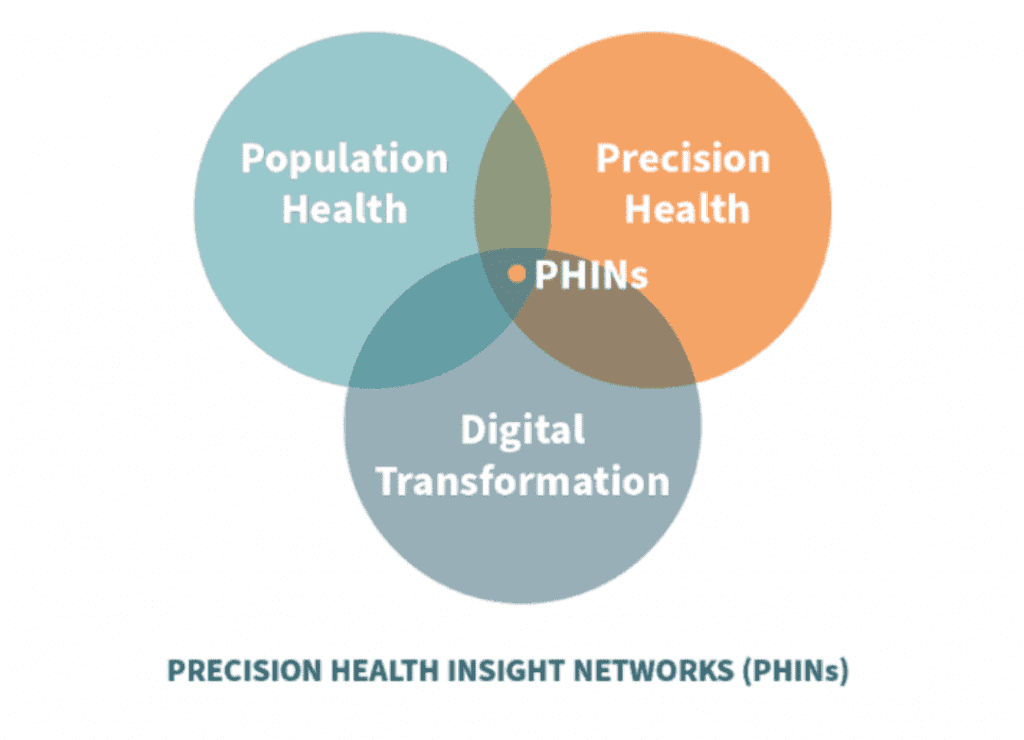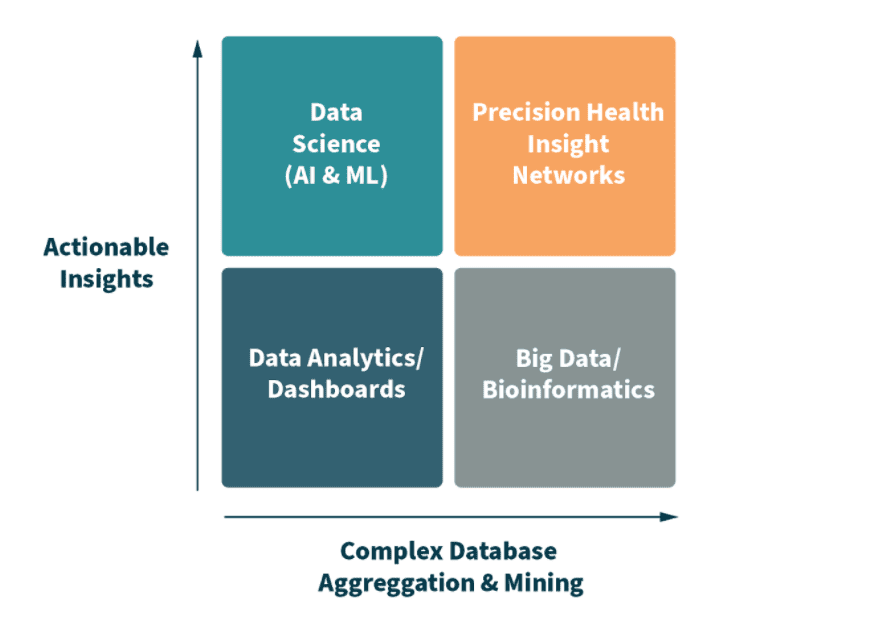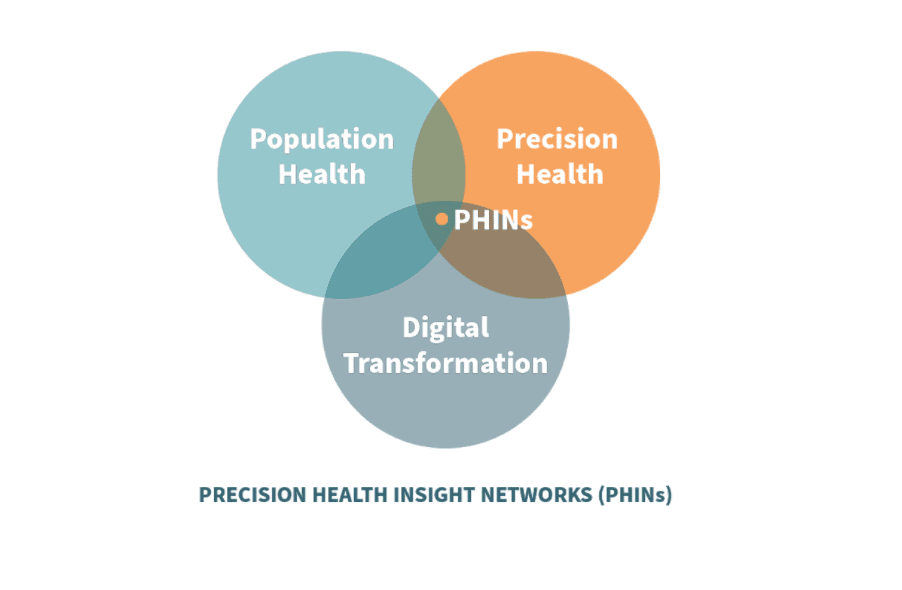On November 17 and 18, some of our nation’s key thought leaders on precision health, value-based care, COVID-19 pandemic response and the future of medicine joined hc1 and Becker’s Healthcare for a Precision Health Virtual Summit sponsored by AWS and Quest Diagnostics. Content from the Summit is now available free on demand.
In his opening remarks, attended live by nearly 500 people, hc1 CEO Brad Bostic acknowledged the challenges healthcare providers face. “I think we all recognize there are challenges for our caregivers in a world of increasing patient volume, increasing demands on documentation, on the fact that we’ve got about 7 minutes on average to see a given patient,” he said. “There’s this continual tension between wanting to deliver outstanding care, but also living within those constraints.”
Stephen Klasko, MD, MBA, President and Chief Executive Officer, Thomas Jefferson University and Jefferson Health, took a moment in his keynote presentation to define precision health and connected care. “Precision Health starts with really a pretty simple concept – that people are people – and not patients,” he said. “What precision health and connected care talk about is how can we help people thrive based on all the factors that are specific to them? How can we predict, prevent and cure in a customized and precise way?”
Some presenters focused on the intersection of precision health and public health in response to the COVID-19 pandemic.
Shez Partovi, MD, AWS Worldwide Lead: Healthcare, Life Sciences, Genomics, Med Devices, focused on how the global response to the COVID-19 pandemic has accelerated the digital transformation of healthcare communications. He featured six different companies using AWS to advance global surveillance, tracking the spread of the disease, drug discovery, diagnostic intelligence, virtual care and vaccine development.
Mick Raich, Chief Executive Officer, Vachette Path and Stark Auditing, took a detailed look at the impact of the COVID-19 pandemic on laboratory revenue. “We took two and a half months of our revenue cycle off and had to restart things,” he said. “Our revenue cycle was laid down on the tracks and now we’re finally putting things back and getting where we need to go.”
Steven Goldberg, MD, MBA, Vice President, Medical Affairs, Population Health and Chief Health Officer, Quest Diagnostics, shared a glimpse into how insight networks can be leveraged to ensure employers can create safe and health work environments for employees during the pandemic.
Brad Bostic and Dave Dexter, Chief Executive Officer, Sonora Quest, sat down for a fireside chat about Sonora Quest’s efforts to put Arizona in front of COVID-19 testing, as well as keeping employees and residents in long-term care facilities safe.
Ken Furton, Executive Vice President and Chief Operating Officer, Florida International University Provost, shared a case study of what FIU, a research university and the fourth largest in the US, is dealing with in the COVID-19 pandemic to bring students and faculty back to campus.
Other presenters focused on creating efficiencies in our care delivery system that increase quality of care and reduce harm through laboratory stewardship and value-based care.
“We are a culture of innovation, but we as a health system are not great at removing those tests that no longer have value or that have been replaced by newer, more accurate tests. This leads to increased complexity in our lab test menu and meanwhile, we are not spending our time training our newest providers in the nuances of laboratory medicine,” said Jane Dickerson, PhD, DABCC, Co-Founder of PLUGS, Director of Chemistry and Reference Lab Services, Seattle Children’s. “So it really isn’t a surprise that there are tests that are ordered and resulted for patients that don’t end up benefiting the care of that patient and sometimes those tests contribute to diagnostic error and patient harm.”
“That notion that independent practices can’t survive in a value-based world is completely wrong,” said Ben Kraus, Managing Director at Kain Capital and Co-founder and President at Stellar Health. “It’s actually the independent practices that are much more successful at value-based care. And that’s both exciting, provides a lot of hope, but also means that we have to find a way to keep our independent practices thriving if we’re going to accomplish these goals as a country to provide better healthcare for our population, our citizens, and to do it more efficiently, so we’re not spending 20% of our GDP on healthcare, which is almost $4 trillion per year, which we do.”
Eric Bricker, MD, Founder, AHealthcareZ and Texas Family Insurance, moderated a panel focused on value-based care that discussed the need for investors, educators, technology, health system and payor leaders to work together to deliver prevention- and patient-focused care. Each panelist from a wide range of backgrounds discussed what precision health means to them and ways that patient-centric data is being used to drive change in their organizations. Dr. Bricker also gave one of his well-known white board presentations exclusively for the Summit focused on employer strategies for value-based care.
Donald Brown, MD, Chief Executive Officer, LifeOmic, explored the potential that healthcare data brings to patient care today and the importance of breaking down data silos to improve patient outcomes. “It’s really interesting to reflect how we assemble big data sets now in a way that was really unthinkable as I was going through medical school,” he said. “Now we can develop a pretty comprehensive view of a person and their current health, their current physiology, right up from the level of their germ-line genome, the genome they were born with on up through the phenome.”
Stuart Beatty, Pharm.D., BCACP, FAPhA, Director of Strategy and Practice Transformation at Ohio Pharmacy Association, Founder of Strategic Pharmacy Initiatives, Associate Professor of Clinical Pharmacy, The Ohio State University, echoed the need to break down data silos during a panel discussion among pharmacists focused on delivering value-based care. He told moderator Rick Christiansen, hc1 Vice-President, Value-based Care, that “one of the big reasons we’re trying to move pharmacists as providers and trying to get those incentives and reimbursement out there, is because pharmacists are such an access point that’s been underutilized for so long. And when you look at all the pharmacists out in communities, rural communities and in inner city communities, this is a highly trained healthcare professional that doesn’t really have an incentive to take care of that patient. Even if we get those incentives in place, they don’t have the data, so it’s definitely something we’re going to have to continue to work on to make sure that we have access to things like lab data, to have access to the multiple pharmacies that maybe they’re getting prescriptions at. As a pharmacist that’s trying to care for the patient, I want to have all of that data available to me.”
While not the focus of his presentation, Atul Butte, MD, PhD, Chief Data Scientist, University of California Health System, Priscilla Chan and Mark Zuckerberg Distinguished Professor of Pediatrics, Bioengineering and Therapeutic Sciences, and Epidemiology and Biostatistics, UCSF, described the essence of the Summit’s goal when acknowledging his conflicts of interest. He explained how proud he was of his former students who had created their own companies, saying, “I think, if anything, they learned in my lab that if you want to change the world we can’t just keep writing papers about it. At some point we’ve got to create some products and services and actually start to deliver that to patients and families and doctors and that’s usually through companies.”
Dr. Butte is absolutely right. Research and discussion are only the beginning. The next step is to take action. Here are some ideas to consider as you think about taking the energy and ideas from the Precision Health Virtual Summit and putting them into practice in your organization:
- Create awareness. Share content from this Summit and other events and articles within your organization and with your peers. Become a precision health and value-based care influencer!
- Involve others. Organizations that are successful at deploying value-based care and other initiatives build a multi-disciplinary team focused on evaluating needs and creating a model that takes into account the needs and strengths of all groups involved. Consider creating a special Precision Health Committee that focuses directly on precision health initiatives.
- Make insights-driven plans. Look for ways to break down the walls between your data silos. Insights derived from organized, combined datasets will drive targeted actions. A partner who is the leader in critical insight, analytics and solutions for precision health like hc1 can help.
Set achievable goals. Don’t be afraid to start small. Early success can fuel both buy-in for initiatives and savings from increased efficiencies can bolster budgets for second stage initiatives.


